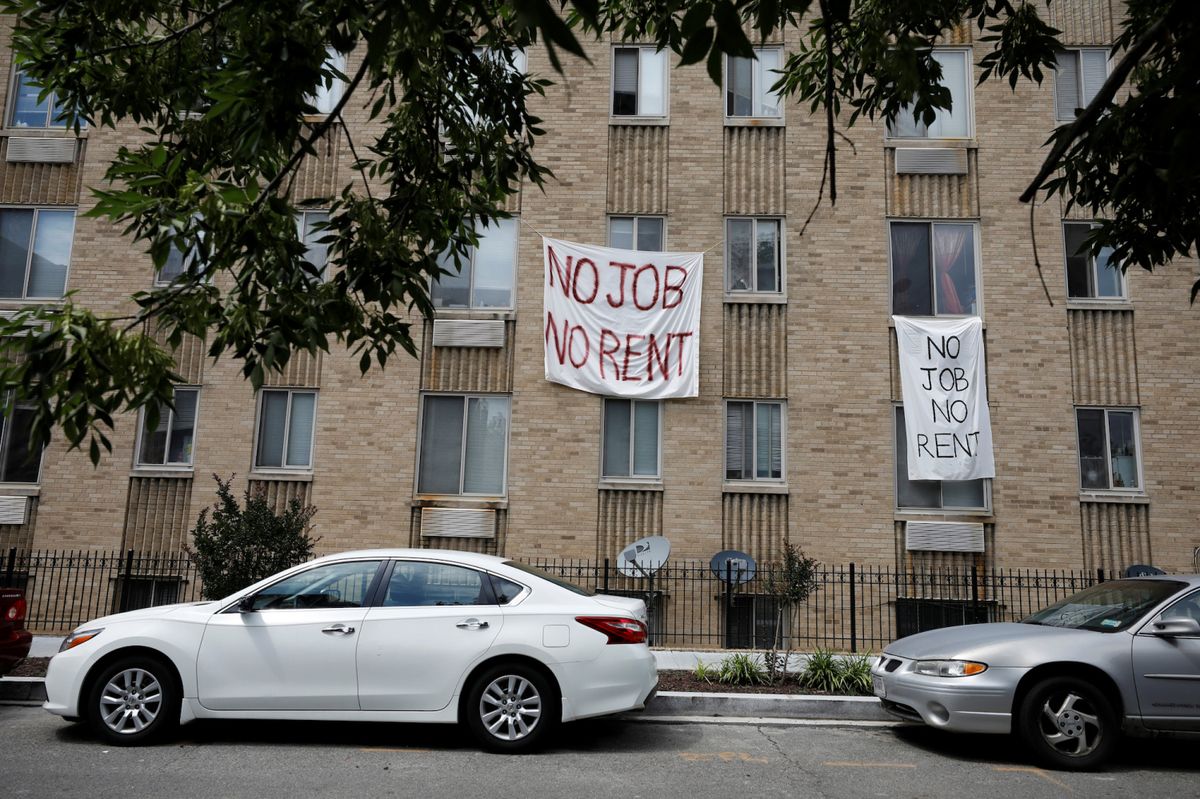COVID-19 has widened the US wealth gap. Here’s why

A few minutes every morning is all you need.
Stay up to date on the world's Headlines and Human Stories. It's fun, it's factual, it's fluff-free.
The coronavirus pandemic has created a totally unprecedented crisis in the modern United States, both medically and economically.
The coronavirus pandemic has created a totally unprecedented crisis in the modern United States, both medically and economically.
Average daily cases in the US stand at more than 200,000, with the total figures for COVID-19 deaths having now topped some 300,000. Numerous states have also reached the ominous distinction of having at least 1 in 1,000 residents having died due to COVID-19.
Aside from creating new pain, the pandemic has also contributed to worsening economic pain in the US, with COVID-19 leading to an increase in the wealth gap.
Research has consistently shown that the Americans hit hardest by the economic fallout resulting from COVID-19 are routinely lower-income and minority groups, members of which have suffered more from job losses and have been more likely to see their savings wiped out.
Unemployment figures also remain at around 6.7%, which, although having dropped significantly from the 14.7% seen in April 2020, remains nearly twice as high as the 3.5% unemployment figure seen in February 2020 before the pandemic was widespread.
These figures stand in stark contrast to the vast increases in wealth seen by some of the world’s richest, who have added trillions to their vast fortunes since the beginning of the pandemic.
As these figures indicate, recovery from the pandemic requires not just a vaccine, but policies that can address the growing chasm between the rich and poor, which has grown ever-wider in the US as a result of the pandemic.
The US wealth gap
Unequal growth in wages has meant that the richest families have seen their wealth explode, while the earnings of the poorest has barely increased. Urban Institute figures show that families earning the most in income increased their wealth by nearly 90% between 1963 and 2016, compared to less than 10% for bottom income earners.
There’s also a racial aspect at play in the wealth gap. White households have typically built up more generational wealth and are more likely to own their own homes than Black families.
For instance, a 2016 Federal Reserve Survey of Consumer Finances found that the median net worth of white households stood at some US$171,000, nearly 10 times the median net worth of Black households at US$17,150.
Coronavirus impact
The coronavirus pandemic has only exacerbated these issues significantly in the US.
In terms of pandemic-related job losses, minority groups have suffered the most. Black workers saw unemployment rates reach 16.7% in April 2020, against a white unemployment rate of 14.2%.
Black women, in particular, have suffered a disproportionately high number of job losses. Between February and April 2020, 18.8% of Black women workers lost their jobs.
According to Dr. Carey Yazeed, business strategist and author of “Shut ‘em Down: Black Women, Racism and Corporate America,” job losses and pandemic-related unemployment has been especially difficult for these groups.
“These women are service providers, with many working in industries such as restaurants, hotels, travel and retail,” Dr. Yazeed told TMS, with these industries some of the hardest hit by the pandemic.
Unemployment has meant that Black workers, particularly Black women, who already face disproportionately low wages when compared with their white peers, saw “their income … immediately stripped away,” with wealth gaps between these groups only set to “continue to widen in the United States in 2021,” Dr. Yazeed explained to TMS.
Minority groups, in normal times, possess less wealth, take home less wages, have less savings and are less likely to own their own homes.
Consequently, disproportionate levels of job loss will only serve to compound preexisting inequality when it comes to wealth and wages. But are we beginning to see an economic recovery?
Although the economy has, in some sectors, begun to recover from the pandemic, this has done little to address the inequalities exacerbated by the pandemic.
As Marco Sison, a financial coach for Nomadic FIRE, told TMS, it is easy to view, in figures, two extremely different experiences of the recovery, which illustrate how “the COVID recovery has disproportionately helped the investors over the workers.”
Although the S&P 500 – the market index of the 500 largest US publicly traded companies – hit a COVID-19 low point of 2,237 on March 23, it has not only recovered, but has exceeded past where it was in February, closing at 3,647 points on December 14.
As Sison explained to TMS, although “the market has gained over 8% since February,” unemployment not only remains high at 6.7% as of November, but this figure is nearly double the unemployment figures before the pandemic hit.
Although markets have enjoyed a recovery, this has not manifested itself nationwide, even as some of America’s leaders have hailed market milestones as an integral part of the recovery.
Bloomberg’s Recovery Tracker illustrates a similar phenomenon, with markets pulling away in their recovery as the rest of the economy continues to endure hardship.
To account for the unequal losses of jobs, savings and wealth during the pandemic, America’s recovery will likely need to be focused on helping those who have suffered disproportionately.
The incoming administration of President-elect Joe Biden is beginning to take shape and so far emphasis appears to be placed on inequality and labor issues.
But nominees alone will not be enough and addressing the disproportionate impact of the pandemic will have to begin, in part, with the next round of economic stimulus.
Until then, the disproportionate impact of COVID-19 on the US wealth gap appears set to continue.
As with any economic fallout, the coronavirus economic crisis, unless addressed by lawmakers, will continue to manifest long-term consequences, resulting in economic scarring for years to come.
Have a tip or story? Get in touch with our reporters at tips@themilsource.com




Comments ()